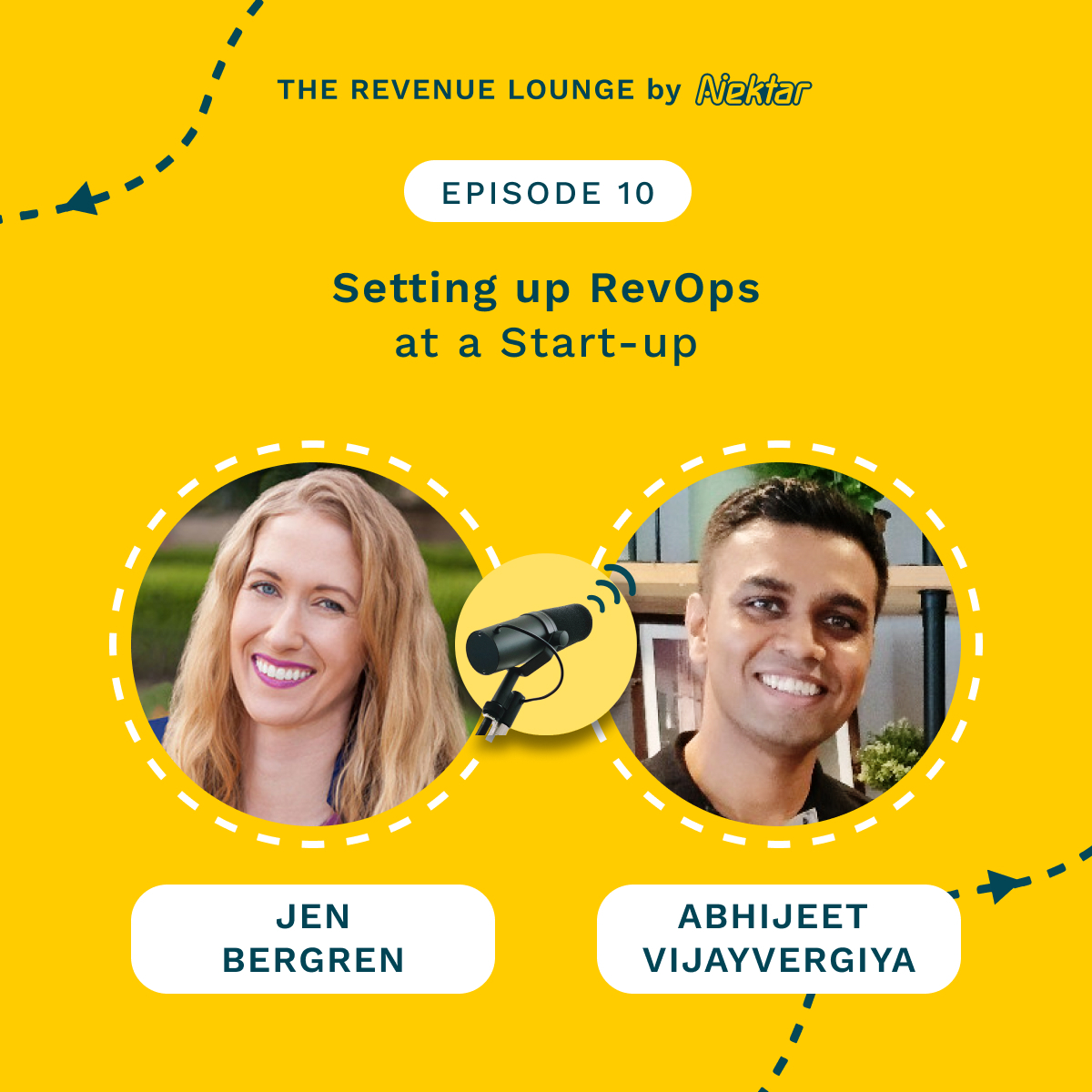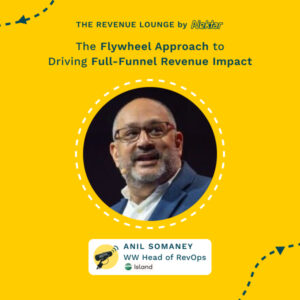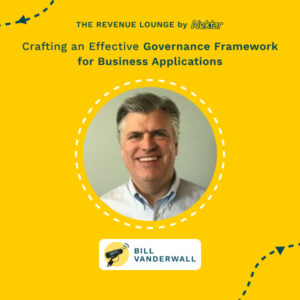Ep #2: Measuring Revenue Operations Metrics That Matter ft. Cliff Simon
April 12, 2023
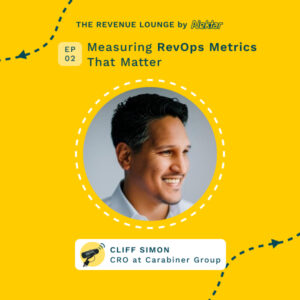
About
The Revenue Lounge
The podcast covers stories from leaders across RevOps, Sales, Customer Success, GTM, Data and Marketing about what drives these functions and what advice they would share with our listeners. With 3 seasons recorded, the podcast currently features 50+ enterprise leaders in the B2B SaaS domain. Tune in to hear from the best in the business
Welcome to Season 2 Episode 2 of The Revenue Lounge Podcast by Nektar.ai – A series of interviews with top Revenue Operations leaders on what drives the function and what keeps them going!
Episode Host – Abhijeet Vijayvergiya
https://www.linkedin.com/in/abhijeet-vijayvergiya-2571056/
Episode Guest – Cliff Simon
https://www.linkedin.com/in/cliff-simon/
Podcast Details:
Podcast page – https://bit.ly/3UznQ4U
Spotify – https://open.spotify.com/show/3DUOqnTpPOJ2xbyl7HdgN3
Google Podcasts – https://podcasts.google.com/u/0/search/the%20revenue%20lounge
Apple Podcasts – https://podcasts.apple.com/in/podcast/the-revenue-lounge/id1645044872
Episode Details:
If you are in revenue operations, you already must have a ton of data within your arm’s reach. But which data is most crucial to track and gain insights from?
And which numbers, if tracked right, can exponentially impact your revenues? You can find an answer to this million-dollar question with the right metrics.
Tracking the right metrics can help you redefine your current processes and devise strategies to increase revenue.In today’s episode, we will talk about Metrics that RevOps should track as an organization scales up this function.
And to answer our questions today is our guest Cliff Simon, the CRO at Carabiner Group. Cliff Is an advisor and fractional executive for several high-growth start-ups where he utilizes his expertise in all things GTM and RevOps, and is an active leader of GTM in multiple communities.
Let’s hear it from Cliff!
Want to learn more about Nektar?
Talk to our team – https://bit.ly/3MishjZ

If you’re in revenue operations, you already must have a ton of data within your arms reach, but which data is most crucial to track and gain insights from and which numbers, if tracked right, can exponentially impact your revenues? You can find an answer to this million dollar question with the right metrics.
[00:00:15] Tracking the right metrics can help you redefine your current processes and device strategies to increase revenue. In today’s episode, we’ll talk about metrics that RevOps should track as an organization scale. And to answer our questions today is our guest, Cliff Simon, the Chief Revenue Officer at Carabiner Group.
[00:00:34] Cliff is an advisor and fractional executive for several high growth startups where he utilizes his expertise in all things GTM and revenue operations. He’s an active leader of GTM in multiple communities. Cliff, thank you so much for joining us today. So glad to have you today for on our show.
Yeah, thanks for having me, Abhijeet!
[00:00:51] So Cliff, let’s get started with a little bit about you and the Carabiner group. If you can share something about your role and what the company does, that would be a great way to start the conversation.
Sure. I think my role’s pretty straightforward. I oversee everything, go to market for the company, sales, marketing, cs, our internal techstack partnerships.
The typical stuff that you would expect a CRO to have purview over as far as what we do as a company. That’s a little bit different. We do RevOps as a service. So unlike a lot of other folks that are out there that do project work, we work with our clients on annual or multi annual engagements where we’re walking alongside them to help drive forward, both go-to-market process and systems, uh, keeping change management and mind, helping them drive insights and analytics and enablement.
[00:01:41] You’re bringing a very interesting perspective. From a service provider standpoint, we’ve had a lot of RevOps people on the show. Some of the best folks that we know are some of our common friends as well. I’m quite interested in our conversation today because you bring in a very different perspective.
[00:01:57] You guys offer revops as a service, and you’ve been servicing a lot of teams who are starting revops or are scaling RevOps. So it brings me to our next question, which is, what is revenue operations? There are different definitions floating. So what is the definition that you follow of revenue operations?
[00:02:15] Yeah. When I think about revenue operations, it’s typically like what does it actually look like to put a dollar in at the beginning of the machine? All of the conversion rates and metrics that come along with following that, that dollar that enters into marketing, that goes through an MQL conversion, through a client acquisition through that next year renewal.
[00:02:36] Right? So driving that net dollar retention and churn metric, it’s so all encompassing. I think a lot of folks pigeonhole it as, oh, it’s just sales ops rebranded, or maybe it’s just sales and marketing ops. Yeah, it’s really like the holistic look at your customer’s buying journey, not just that initial acquisition, but their entire journey with you when you’re thinking about that LTV mapping that to a go-to-market process.
[00:03:05] And then building up the technology and systems to meet that process, right? And then driving and building the additional sub structures around that, you know, in enablement, insights and analytics so that now you can walk forward in a data-driven model as a company.
I think this is definitely in line with where the trend is and I was reading one of the McKinsey blogs where they’re talking about this whole full funnel integration and how it’s important for organizations to start mapping the customer buyer journey and meet them
[00:03:34] on their journey point, then enforcing a sales process. So I think as you described, revops in your definition of connecting with the buyer journey, I think it’s pretty relevant in today’s market. So before we move further with the detailing rev ops and our questions related to that, I’d love to hear your story on how did you get into RevOps, and I think let’s go a little back on how you started your career and what’s been your trajectory so far, and what brought you to Revops?
[00:04:00] Yeah. I started my career back in the day working for Verizon, doing machine machine stuff, which everyone I think today calls IOT and seeing how operations and systems could affect the flow of data because right, if you’re working for a telecom, it’s all about the metering and flowing of the actual data, regardless of what that data is. And I think it’s sort of caught the bug a little bit there being very analytically driven. Fast forward throughout my career just.
[00:04:28] Always having to do some Salesforce admin type of work or you know, as one does as you work through fast growing companies. Caught the bug probably, oh gosh, maybe like five or six years ago where I was the one creating comp plans, doing the entire commission structure, and having to do all of the reporting on revenue back up to the C-suite and really enjoyed it.
[00:04:50] I think very much like most other folks in Rev. You’d never planned to be here. You sort of fall into it because there’s something about the data that just draws you in. And [00:05:00] I know my wife hates it, but I like working in Google Sheet sometimes. So it’s just sort of accidental and that’s sort of how that happened.
[00:05:08] And as far as carabiner, uh, had the good fortune to me, a very bright young man on a Slack channel in December of 2020. As they say, the rest is sort of history, right? Took a chance on each other and it’s been fantastic ever since. Pretty awesome. That’s pretty interesting journey. Moving forward, let’s look at measurement of revenue operations.
[00:05:28] I mean, we discuss about what Rev Ops says. So as we set up as a rev ops organization, right, what metrics you think are foundational and should we track? So what are these must have? And why would you want automations to start tracking these? So I think the must have metrics for rev ops always have to scale back to the actual company metrics, right?
[00:05:51] Rev ops is supposed to be that tied, that raises all boats and it’s gotta affect all the benchmarking. So the first most important thing is that [00:06:00] having an understanding of your current state, where are you today? Being real about those numbers and not fluffing them up, and then starting to. The progression over time, right?
[00:06:11] Rev ops is, I’ve said this before, it’s like one of those places in a start up where you can’t just throw a million dollars at it and have it fixed in 90 days, right? It’s, it’s a hypothesis. It’s testing, it’s actual science, right? You have to gather empirical data and then go back and see what the data tells you, and then make the appropriate adjustments.
[00:06:28] And there’s no shortcuts for that, right? You, you, you have to go through the motions and actually do the work. So if you want to talk about the big ones. MRR, ARR, right? What’s, what’s your growth rate? Um, net dollar retention. Churn. And then for each individual business unit, looking at the conversion rates.
[00:06:47] Across those business units, right? So your MQL conversion, how well are you closing on your deals in sales? Is the churn metric getting lower as you are doing a better job of customer success? And then [00:07:00] the other thing I would be, uh, tracking, which is a little bit more difficult to do, is more nebulous, right?
[00:07:05] Is tracking that operating cadence. Are you regularly? With the various business departments to make sure that information is being shared. Have you developed a system for that? So while that might not be a metric, I think that’s the underpinning of it. And when is the right time to start rev ops, because everybody talks about it and different schools of thought on what’s the the right time to start.
[00:07:29] When would you recommend a fast growing company should start looking at Rev op? Seriously, as soon as you can. Like seriously, as soon as you can afford to do it. Do. For us, we started it from the very, You know, making sure that everything we were doing was data driven, that we were collecting the right data points, that we weren’t collecting, things that we didn’t need, but being forward thinking, looking at the data points that we knew we would need 3, 4, 5 years down the road, so that way we would have enough historical data to make meaningful decisions.
[00:07:58] I’m seeing more and more companies adopt. Operations or rev ops or any version of that as they grow into a mature rev ops org sooner and sooner, and think about it, right? How many times does a SaaS company bring in that charismatic sales leader who has a deep Rolodex and they get you to 1, 2, 3, 4, 5 million in ARR just by their sheer, magnanimous, uh, personality, right?
[00:08:26] They go out, they do it, they don’t record any of it. There’s no notes. And all of a sudden you think you have go-to-market fit. You definitely got product market fit, right because it’s selling. Um, but you have no repeatable process. If you put process in on the front end and you’re capturing all that data, you can try to do your best to capture that lightning in a bottle and, and look at the data set and say, oh, this is where we’re winning.
[00:08:51] This is what’s going well. And now you can focus and it’s not just that one person that comes in is a flash in the pan and gets you to this really exciting point, and [00:09:00] then all of a sudden your growth rate just plateaus or just, you know, the next py, but actually takes you where you think you’re. Where everyone hopes you keep going on that parabolic growth journey.
[00:09:12] That’s a great point around foundational metrics if organization starts scaling. Right, and what would be the metrics they should start focusing? So how would you define like the metrics to be tracked at seed stage or foundational metrics when DevOps is getting set up versus metrics that are for a steady state company or like after a couple of quarters where DevOps is functional?
[00:09:32] How does that change Early on, it’s gonna be client acquisition metrics, right? What’s our average contract value is? Are we actually losing deals because of price or do we have flexibility there? Time to close time in between different sales stages. All your basic conversion rates, right, uh, on the, on the top of funnel and, and mid-funnel.
[00:09:52] Once you graduate past that, I think you immediately turn to net dollar retention and start thinking [00:10:00] about dollar churn as opposed to perhaps customer churn, cuz it might not be a terrible thing to turn some of those very early customers if your pricing has. In a year and a half, right? Or try to see what you can do to scale them up to your new pricing over a two, three year period, right?
[00:10:17] Reward those folks who are coming on board with you early on, and then after that, it starts becoming gross retention, right? You wanna hold on to every single customer, every single dollar, and I think that becomes the main focus You’re gonna be bringing on new folks and you keep tweaking that and working it, but at at a point of scale.
[00:10:36] 70% of your revenue is coming from existing client base. You gotta hold onto what you have and you gotta make sure that they’re happy. You know, not just that they’re satisfied. So when, when you look at your clientele, what’s the number one common problem that you see across companies who are, were talking to you from a DevOps perspective.
[00:10:55] They don’t have their arms wrapped around their data. They have tons of it. It’s sitting in data lakes. None of it is talking to each other. None of it comes into one unified source and they have no idea how to actually get through it in a meaningful way. And if you don’t have that, you can’t do anything else.
[00:11:17] And how do you like support automations to move from this kind of a situation or data islands or data silo? To a place where they can start having those metrics that you talked about, which can help them get to predictable revenue growth. So how does that journey look like? How do you help them get there?
[00:11:36] It’s a lot of conversations in walking through the data and asking what, why did you measure this? What does this mean? What were you looking to accomplish in this? Why was this done? This. Is it because there was an old process that required it and now they’ve augmented and gone to some new technology that doesn’t require that process?
[00:11:54] Funny example, what my COO used to be in, he used to work with companies and there was a process that had cost this company something in the neighborhood of like 30 million over a decade. And it was because in the early nineties, somewhere along the way you had to fax something to somebody and they kept that step in the process all the way.
[00:12:13] They took a stab at it and looked at the process and realized that the process was still something from the early nineties. All of a sudden you fix that and you’ve, they were able to recoup a significant amount of revenue because they were able to streamline the process. Interesting. What about GTM alignment?
[00:12:29] I think one of the big problems, apart from data that you mentioned, uh, we keep hearing is about alignment across GTM team. Right. And rev ops is also supposed to, Sales, marketing, customer success, and even product operations to some extent with companies having PLG motions as well. So how do you see Rev ops playing a role in the broader GTM alignment, and what are the metrics that come to your mind?
[00:12:53] Which organizations should start? Tracking from whatever’s per perspective for this alignment. I don’t know if there’s a set [00:13:00] metric that will actually help drive the alignment, other than the fact that everyone should be aligned on getting you to that next a r r goal or that next employee count, or that next raise, whatever that, that next strategic goal is coming from the top down.
[00:13:13] The alignment is crucial. Everyone needs to be on the same page. You, you can’t have 10 kayaks all going in different directions, right? You need to all be in the. Rowing together with your c e o as the cocksman, just calling it out, right? If, if you’re not working in lockstep, your efforts aren’t being multiplied, and sometimes you’re, they’re actively being hindered, right?
[00:13:35] Not necessarily through anyone’s fault, but from a lack of transparency or a lack of communication. So making sure that you are. Holding those biweekly meetings or those weekly meetings, or those monthlys, depending on what cadence you need to be on, um, and holding them as sacred are, are very important.
[00:13:55] The teams have to talk a and I think one things that happens a lot of the times [00:14:00] is that, you know, the C or head of sales, whatever that title might be, within the specific company, tends to have the number over their. And marketing’s not necessarily being held accountable for their piece of it, or CS isn’t being held accountable for theirs, uh, products not being held accountable for making sure that things are actually shipping on time and that those sprints are moving accordingly, right?
[00:14:22] Everyone looks at the revenue and just blames sales, but it’s, it’s really a team effort to get there, right? Marketing has to provide the, the right amount of weeds and the right level of brand awareness and education. CS needs to make sure that they’re driving. Moments of delight for the customers, that they’re actively being proactive about addressing issues that come up and overcommunicating and product needs to make sure that they’re taking all that information that they’re hearing from CS and from the customers, and continuing to innovate on the product and going up against what’s happening within the industry and making sure that your feature sets are rich and competi.
[00:14:59] All of those things need to exist for sales to go and be successful, to drive a number. Right. It’s, it’s a team sport. It’s not just one department. And Rev op sits at the center of that, right? As that, in many cases as Switzerland to help mediate or to help make sure lines of communication are open. Yep, yep.
[00:15:17] Fully agree with you. Love the sports analogy. I always found sports and sales being very similar. And we’ve got so much of data analysis that goes into sports and sports performance improvement. I think a lot of that can happen in go-to market as well. And rev ops can be that data center or the NAV center of sorts, which can actually bring a lot of visibility into driving this high performance culture across the go-to-market team.
[00:15:44] And just like any sports team out there, you need a lot of alignment and everybody moving in one common direction and going and winning the. I think that’s a similar thing as you pointed out, like GTM teams can have one common goal and working [00:16:00] towards that common mission. So I think that’s a great way to look at it and think of it.
[00:16:03] And finally, metrics matter. Rev ops is Moneyball. Yeah, rev Ops is Moneyball. And I think we’ve got this Moneyball moment. I know Peter Kazi. keeps talking about it a lot. Moneyball. In sales. So I believe we have a Moneyball moment in rev op as well. Now. Yeah, on the metrics, I think it’s easy to also get onto vanity, right?
[00:16:24] Just like in B2C businesses where there’s so much of vanity metrics, which drove valuations up, even in B2B SaaS, I think we had this overheated valuation drive that happened in 2021, early 2022 as well. So what are some of these vanity metrics that need to be avoid? Because that can be distracting and take focus away from what matters, which is revenue and might not be contributing to long-term, predictable revenue, growth, productivity, and effectiveness.
[00:16:53] So what comes to your mind in terms of vanity metrics that can be avoided? Depends on your model, but I could see [00:17:00] MQL being a vanity metric, right? If the lines share them are not converting or there’s not an actual. Rigor behind the way that they’re being scored. Opportunities created, right. If, if you’ve got a lack of qualification, it can be a vanity metric.
[00:17:18] I think people are by and large getting away from the vanity metrics more and more. I think especially with just the way that we’re seeing the VCs act, the way, the level of education that’s happening overall in the ecosystem. Everyone’s being watched so carefully and you have to be driving efficiency.
[00:17:37] I think by and large people just don’t have the time for ’em anymore, right? You only have so many hours in the day. And like we were talking about before we started the recording, right? Things move fast. In SaaS land, if you’re constantly looking at things that don’t matter, the actions that you’re taking and the things that you’re deriving from those dashboards and.
[00:17:54] Reports that you’re looking at aren’t gonna help you get to where you need to get to. So I think a lot of people are pushing them to the wayside as [00:18:00] they start honing on the things that do matter. 100% with you on that. I’ve been into that place before in past when I got driven by Vanity Metrics, and it bites you back.
[00:18:11] I mean, you might be good for a quarter or two, but it invites you back if you don’t focus on what. And it just happens right as automations grows and scales, they have so many different stakeholders functions, and each of them start having their own OKRs. So it can be distracting. And again, rev Ops, I believe, can do that role of tying everything together and bringing focus and attention on what matters.
[00:18:34] Moving away from the individual departmentals, which might work in for that function, but not work for the common goal of the company. And that’s where I think DevOps can distill vanity from reality. Yeah. Moving on in terms of the common mistakes, right? So you mentioned some of the challenges that you see, uh, with the clientele that you guys are servicing and how you add value.
[00:18:57] But if you look at the mistakes that leaders make, right, [00:19:00] when they measure effectiveness of rev op function, right? And a lot of time some of these leaders will not invest in rev ops or treat it as a tactical function for firefighting. Then giving them the strategic acumen and empowerment that they. So what are some of these mistakes that you’ve seen leaders make when they measure effectiveness?
[00:19:19] I think one of the biggest ones is that they don’t give enough time. Right? We sort of talked about that too, where it’s, it’s one of these things, it, it’s very time intensive and you need to be thoughtful and do it the right way. I think very often, especially with immature leadership, which there’s a lot of folks out there, We’re really good individual contributors, and now they’re being asked to be managers or they were a decent manager and now they’re being asked to step up and we, we see a lot of that as companies continue to grow, right?
[00:19:51] And there’s nothing wrong with taking a chance on someone, but what we’re seeing consistently is that folks don’t necessarily have the patience [00:20:00] and don’t understand that it takes time to do these things and that Rome wasn’t built in today, but they’re up against a really tight, a really tight, difficult situation in having to.
[00:20:11] The here and now and having to. Work ahead from being in a position where they’re typically behind a number, right? You’re, you’re chasing, maybe there is a poor planning session and you’ve got a new product that’s supposed to be coming down in Q3 and it’s gonna save the day in Q4. Like, uh, Probably didn’t wanna forecast that.
[00:20:34] So I, I think not giving it enough time is, is probably the, the biggest issue. The other thing is thinking that it’s like just this, this cure-all right, you’ve renamed something as rev ops, but they’re not actually taking the time to really understand rev ops and they haven’t looked at the totality of the change management around it.
[00:20:53] Right? So they. Coming in and making adjustments to systems, but they don’t understand the, the long-term effects of that, and now they’re think they’re expecting a, a different outcome. Right. So again, I, I don’t think a lot of it is necessarily on the metrics side of it, right. From a metrics measurement.
[00:21:13] But I think success here is gonna be driven by things like user adoption tech. Have you, have you been able to drive down TechNet or you’re accumulating more? And then overall efficiency within the business across the different benchmarks that we mentioned before. Got it. Okay. Uh, that’s very important point because a lot of companies don’t go all the way.
[00:21:36] Right. They will start initiative, there’s sort of project, they’ll put someone in charge, but they’ll not empower them, they’ll not give them the time it needs. So with you on that, I mean there is a lot of DevOps initiatives that. Just largely because the commitment and the time was not there. So it’s pretty important for Ians to commit to it when they start Rev op.
[00:21:56] So what do you think would be like important traits that a [00:22:00] Rev ops professional must possess? Where do you get these folks who can deliver this incredible value we see in that function? What are the most common traits that make a great revs? Yeah. I’ll hop to in one second. I just want to touch base on something you just said that.
[00:22:15] I thought that I have, which is the most important trait that we see from an executive perspective, from that executive maturity in like what a good engagement looks like is that they have enabled and empowered that product owner internally to be able to navigate a relationship with a company like ours, right?
[00:22:35] Number one key for success. The reason that that works so well is because they typically have traits like real good project management. Very good at communicating, right? And being able to communicate not just externally outside of the company, but being able to navigate and communicate well internally with the different business unit owners, right?
[00:22:58] So they’re able to go to marketing, they’re able to go to cs, able to go to sales. Able to go to product and effectively communicate what’s trying to be accomplished. They’re going to the CEO as well and making sure that everything is in the line, right? So it. That one sort of throat to choke, but it becomes the most vital piece in or any relationship that we have.
[00:23:22] Right. And I think it. The same thing that e even if you’re, you don’t have someone like us in that you’re walking with along, uh, externally, but you’re only working with internal stakeholders. That pro project management requirements gathering and the ability to communicate those things effectively, the communication piece is the biggest.
[00:23:41] Yeah. It’s such an important role, which touches every aspect of go-to market function, right? So I think communication becomes the most important skill fully with you. Ability to listen to each of these personas you service, and then be able to articulate back, uh, what you expect of them and what you can do for them.
[00:24:02] I think it’s super important. And also removing these silos and blind spots. Again, communication is the key. I, I think there’s another one that’s sort of tangentially related, which is the ability to not get fra. I don’t know how, how else to sort of say it, but like a calmness, right? There’s, we’re always putting out fires in, in the rev op sector.
[00:24:23] Um, but if you can be calm and see through that and handle that, you can start to stop looking at the symptoms and start looking at the actual causes. And now you can start doing fire prevention instead of. Firefighting. Absolutely. So where do you see the future of rev op? You guys work with a lot of clients and you’ve been implementing some best of class stuff for them.
[00:24:46] Uh, and you might also have exposure to the technology stack they’re using. You also track some of the upcoming startups and there are lot, a lot of action happening in the revenue option space. Right. So overall, when you look at future of rev ops, in terms [00:25:00] of the function, in terms of the way it will evolve, let’s say the next five.
[00:25:05] What does trajectory looks like to you? I really do think we’re gonna see more rev op folks in the C-suite. I think that’s sort of like the big bet, especially with this recession looming. What experts are experts? Oh, people can’t see me. I’m doing, air quotes are saying are is gonna be a very long recovery, uh, similar to what we ran through with oh eight in any type of scenario where you have a longer.
[00:25:31] Season of economic uncertainty or recession like efficiency is everything. And that’s the core of Rev op, right? It’s driving efficiency. So I can’t see Rev Ops do anything but continue to grow. I mean, the rate at which it’s grown this year has been insane. Know there were 17,000 open jobs on LinkedIn total, you know, between people enroll and, and, and folks looking in January, that number is over 50,000 now.
[00:25:57] Wow. I didn’t check that. It’s 3X.
Yeah, 3X this year. You know, the hashtag’s only been around for what three. So it’s gonna continue to grow. It’s one that everyone’s getting on board with. So I, I, I think we’ll see what happens, but I don’t think we’re anywhere close to rev ops being dead or being like overhyped or anything like that, right?
[00:26:22] I think it’s definitely here to stay and it’s, it’s important, right? These are all things that people have been doing for decades and decades in, in the enterprise space, right? So used to running so fast and so loose at growth at all costs. And that’s not how you run a business, right? You, you can’t keep burning a million, 2 million, 5 million a month.
[00:26:43] Absolutely. I think that this also brings to the cushion of supply and demand gap, right? I mean, you mentioned we have three x growth in open jobs for rev ops within the last one year. How do you see the supply coming in where. See this professions will come from, yeah, that’s the big issue right now, right there.
[00:27:02] There is not enough supply. Everyone’s going after the same candidates. That’s why we’ve seen wages increase so incredibly. We’re gonna put out a rev ops compensation survey. Well, by the time people hear this, it’ll already be out. Right. We’re hoping to get a ton of folks to talk about it and share their stuff in an anonymized way so that we can make that open source to the entire community.
[00:27:26] It’s been wild to see the differences that have occurred in just the last year to 18 months. I’ve seen admin salaries go from, you know, like 50 K to a hundred k. In some cases, directors went from making like one 20 to making 180, like fairly significant shifts. So, I mean, I’m excited to see what happens there and, and to get more data around it so that we can all know, you know, what is the actual lay of the land versus what the private equity firms or the VCs.
[00:27:56] Those of us in the hiring seats think it should be based off of past [00:28:00] experience. No, I think it, it’s important to get analysis done here, so I believe our audience are going to be pretty interested in seeing the report, so whenever you guys publish it, do share. Yeah, will do. Like, like I said, it’s gonna be open source.
[00:28:14] Anyone can see it. We’re gonna make it a public facing power bi. So folks can slice and dice the data on their own. Look at it via years of experience, title, regionality, things like that. Yeah, there’s a great service to the community. I think the community deserves more transparency, especially when they play such an important role and more so in such kind of a macroclimate where Rev becomes one of the most important function.
[00:28:39] I think this will be very, So let’s move on to our next section, which is Rapid Fire. So moving a little away from Rev Ops, but just to know your interest and understand you better. So let’s talk about books. What’s one book that you’ve loved in the recent past? One book that I’ve really enjoyed over the last couple years is Extreme Ownership by Jocko [00:29:00] Willink.
[00:29:00] Buy it for everyone that reports into me. Just let them know we’re on the same page. The other book I read every day is The Bible, so those are my, my two that. Read the most. I definitely reference Jocko probably more than I should. Yeah. Very nice. What’s your favorite part about Rev ops? Uh, I like playing with the numbers.
[00:29:19] I like seeing what’s possible. I like. I’ve definitely enjoyed forecasting and looking forward to the future and saying, this is what is achievable. How can we now build a plan to execute on this? So, and that’s the probably thing I like the most. The other part, I think, in my specific role in doing this in within a consultancy that does rev op, is that I love getting to see.
[00:29:45] All the different ways that rev op is being solved across, you know, dozens of different clients. Uh, in some cases I get to go and be that resource, right. And it’s just really rewarding to see the function growing and people continuing to, to adopt it. Pretty awesome. I think you got a very interesting vantage point to see all the good stuff and action happening across different companies.
[00:30:07] So what’s the worst part of being in. The time it takes to implement something sometimes, right, you wanna do it right? So the testing, the qa, the qc, going back and forth, and sometimes having to fight over what is. Seemingly an insignificant data point, but then realizing that that insignificant data point to somebody else and showing them how that’s tied into seven or eight or 10 different things.
[00:30:37] Cause it’s tied to a product, it’s tied to this price book. Like, and then they can actually see like how all this webs together, um, to drive a business forward. Yeah, just how painstakingly detail oriented it can be at times. Yeah, yeah. With you on that, uh, what’s one rev leader you personally respect and look up to and why?
[00:30:59] Oh man, it is a tough one. I’m sure there are plenty of those, but what’s one that comes to your mind? Yeah, so I’m fairly active in the W Ops community and there’s a handful of folks in there who are. Technically brilliant. And the person that comes to mind for me is Eric Lopez. The dude is a flows wizard and is always so willing to give his time, um, so knowledgeable.
[00:31:28] Like I could ask him anything, Salesforce or rev ops related, and he’ll have an answer for me within like five minutes and not like, just like a little snippet, you know, it’s like paragraphs. So definitely appreciate. Yeah, pretty awesome. I think everybody needs someone like him on their team. And what’s an advice that you received from someone that stayed with you that you’d like to share with us?
[00:31:53] Preparation prevents piss poor performance. Just always being prepared, always being on top of your game, even if you don’t feel like you’re there for taking the time ahead of time to make sure that you have everything you need, it helps overcome a lot of. Deficiencies that we have as people.
[00:32:10] Yeah. It’s important to sweat in the practice so that you don’t bleed in the war. So, yeah. Important to go prepared. So coming to the end of the show, last one for you. What’s one piece of advice you like to give to people who like to have your job someday? Be persistent and do the things that you say you’re gonna do.
[00:32:33] Like just keep showing up. Opportunities come up out. Absolutely nowhere when you least expect it, but you need to be putting in the work and putting your head down and just going at it and grinding. Like sometimes the, the, you don’t feel like showing up. And a lot of life happens in showing up. Yep. Yep.
[00:32:53] Showing up matters, and especially if you’re in sales, your last quarter is as good as yesterday’s newspaper and you need to pull yourself up whether you’re at a bad quarter or a good quarter. Great day, bad day, shitty call. But you need to show up. So I think showing up matters, man. And especially if you are in sales, and I think for DevOps, it’s the same thing, right?
[00:33:16] You are interacting in a critical business function. Yeah. So showing up matters. Thank you, Cliff. Thanks for your time today and thanks for sharing all these wonderful insights and being candid about your experience and insights. We loved having you. Good luck with everything. Thank you.
Thanks, Abhijeet. Take care.

Ep #1: Navigating the Downturn with a Hyperfocus on Productivity
Listen Now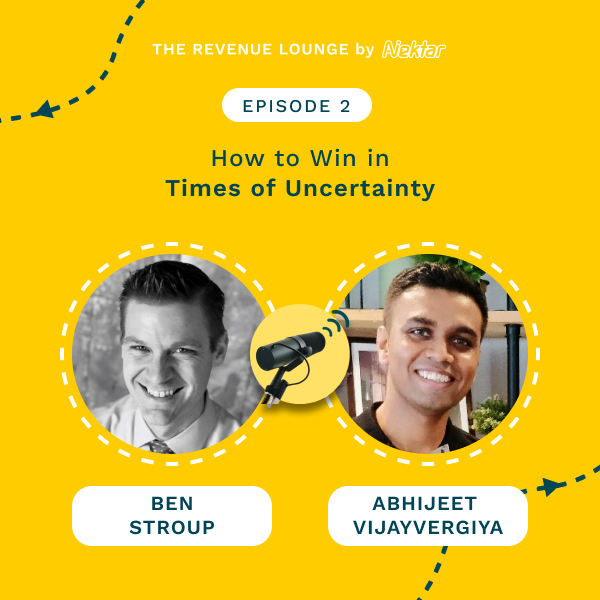
Ep #2: How to Win in Times of Uncertainty
Listen Now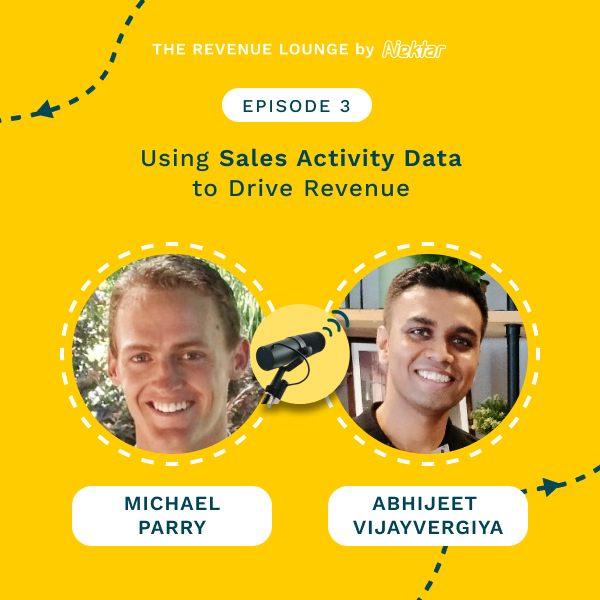
Ep #3: Using Activity Data to Drive Sales Productivity
Listen Now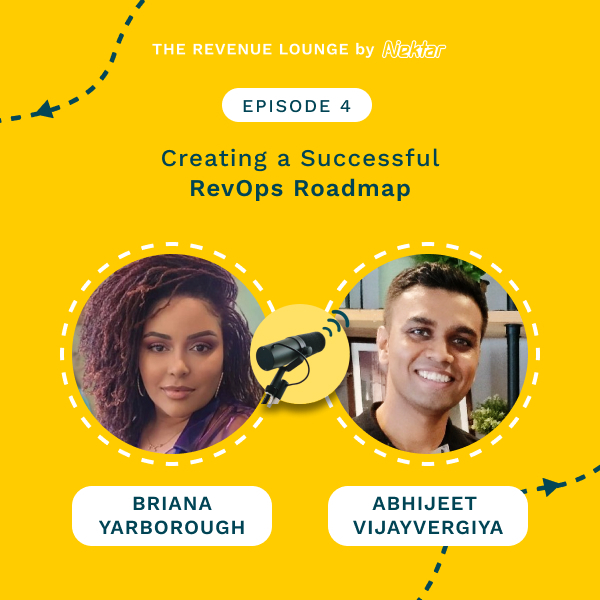
Ep #4: Creating a Successful RevOps Roadmap
Listen Now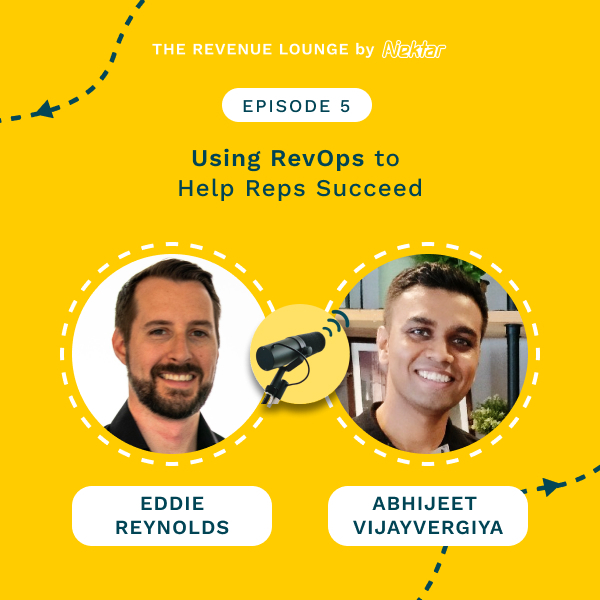
Ep #5: Using RevOps to Help Reps Succeed
Listen Now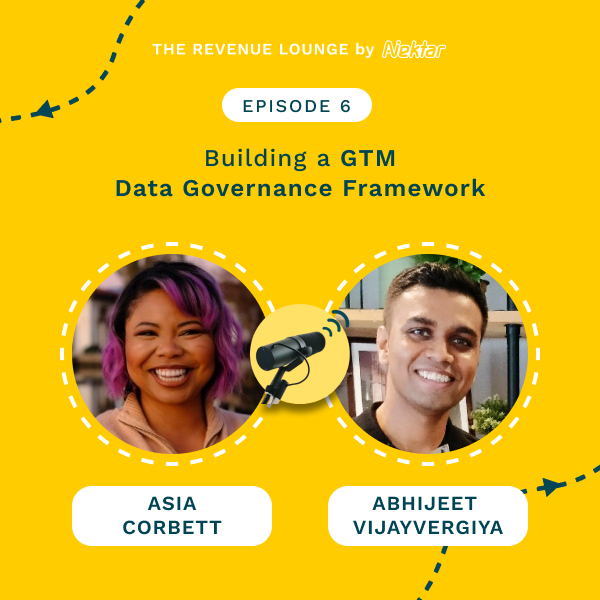
Ep #6: Building a GTM Data Governance Framework
Listen Now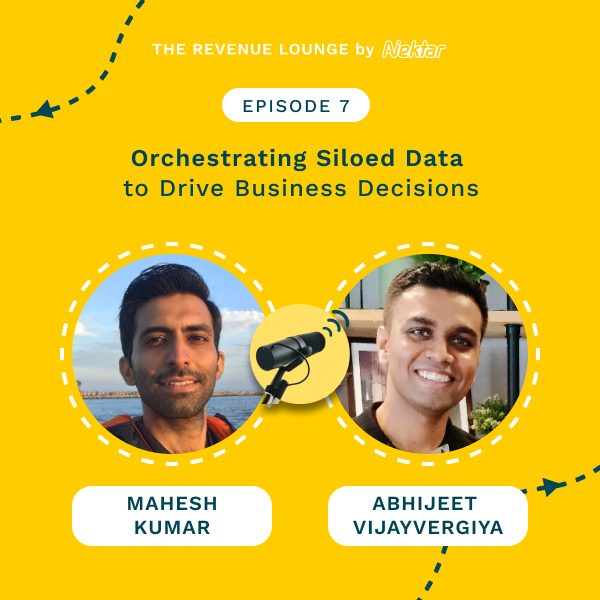
Ep #7: Orchestrating Siloed Data to Drive Business Decisions
Listen Now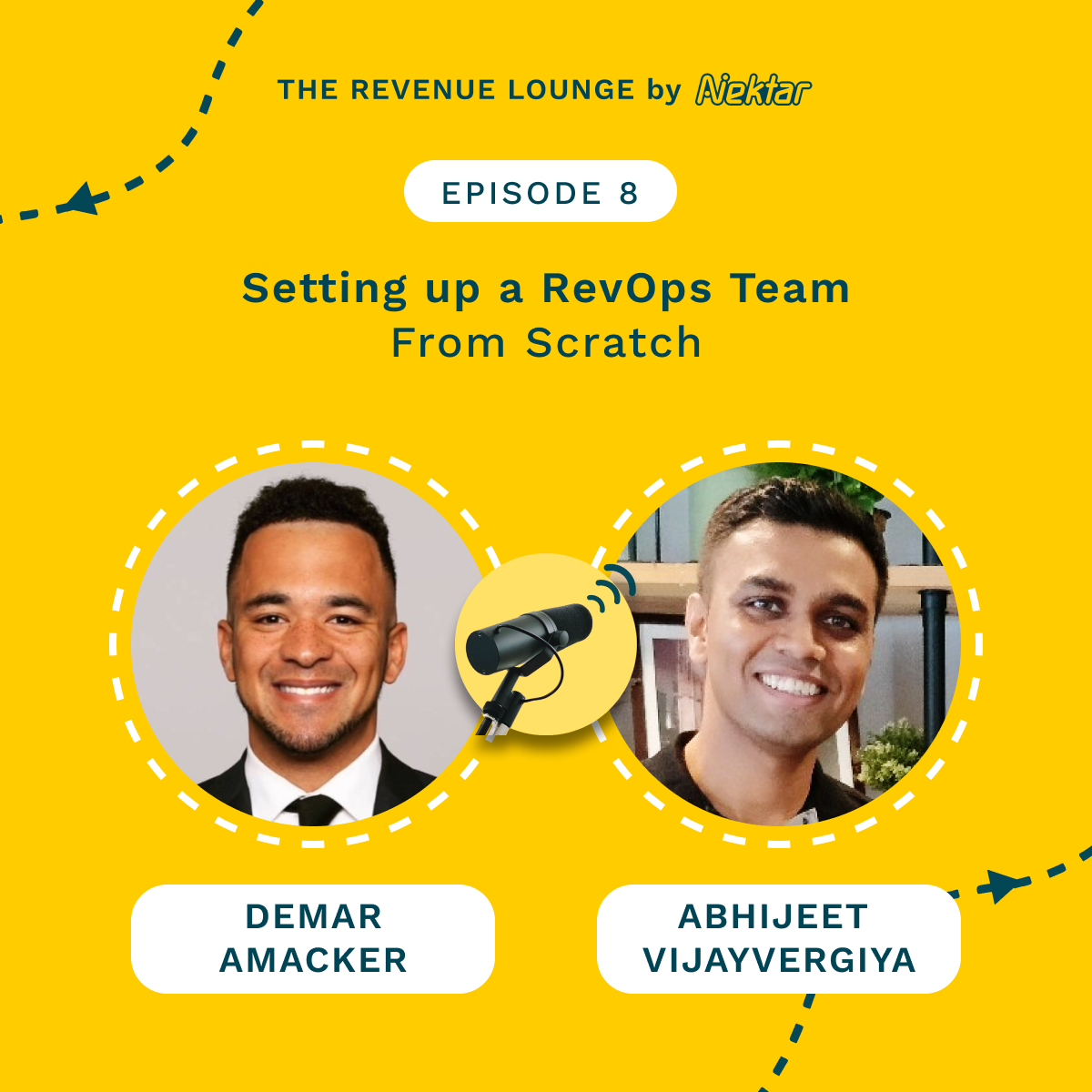
Ep #8: Setting Up a RevOps Team From Scratch
Listen Now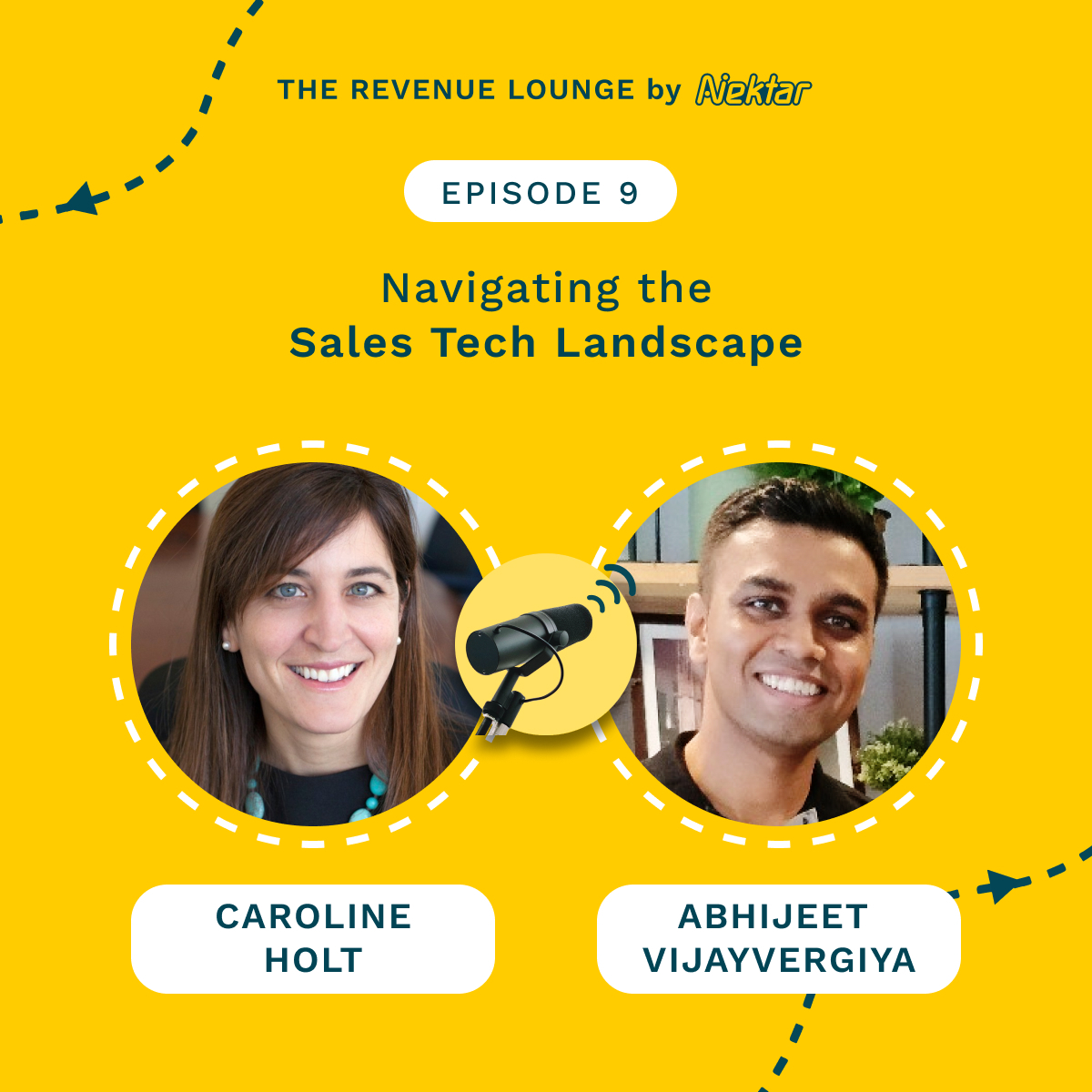
Ep #9: Navigating the Sales Tech Landscape
Listen Now